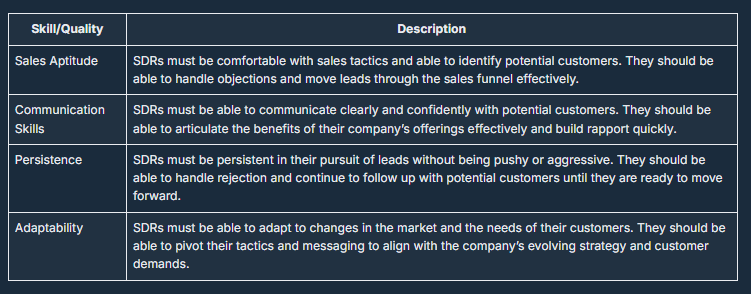
Aleksi
In today’s business landscape, companies rely on sales teams to drive their growth and revenue. One essential player in the sales process is the Sales Development Representative (SDR).
So, what is a Sales Development Representative? An SDR is a specialized sales professional who focuses on lead qualification, prospecting, and appointment setting. They are responsible for identifying and reaching out to potential customers who may be interested in the company’s products or services.
SDRs play a critical role in the sales process, helping to generate leads and opportunities for the sales team. Their efforts directly contribute to business growth and revenue generation. According to a Gartner study, 89.9% of companies use two or more contact data sources to meet their sales development needs.
Key Takeaways
A Sales Development Representative focuses on lead qualification, prospecting, and appointment setting.
SDRs help generate leads and opportunities for the sales team.
Their efforts in sales development directly contribute to business growth and revenue generation.
Role of Sales Development Representatives
Sales Development Representatives (SDRs) are an essential part of the sales process, responsible for identifying and nurturing potential customers and setting appointments for the sales team. Their primary role is to qualify leads and build relationships with prospects to generate new business opportunities.
SDRs are responsible for a range of duties, including:

By performing these duties successfully, Sales Development Representatives help to build a pipeline of new business opportunities that contribute to the overall growth of the company.
Qualifying Leads and Prospecting
To effectively generate new business, Sales Development Representatives (SDRs) must be skilled in lead qualification and prospecting. Lead qualification is the process of evaluating potential customers to determine if they are a good fit for the company’s product or service. Prospecting involves researching and identifying potential customers who fit the company’s ideal customer profile.
SDRs use a variety of strategies when qualifying leads and prospecting. One common approach is to research a company’s website and social media accounts to gain insight into their business needs and pain points. SDRs also use tools like LinkedIn and data providers to gather additional information about potential customers.

Effective lead qualification and prospecting are critical to the success of SDRs. By identifying and targeting qualified leads, SDRs can maximize the sales team’s time and resources, resulting in higher conversion rates and revenue generation.
Duties of Sales Development Representatives
Sales Development Representatives (SDRs) play a crucial role in the sales process by qualifying leads, prospecting, and setting appointments for the sales team. Their contribution to the business growth is significant as they are responsible for generating new business opportunities and revenue.
As part of their responsibilities, SDRs employ various strategies to identify potential customers and evaluate their fit with the company’s offerings. Lastly, they use different communication channels such as phone, email, social media, to engage with prospects and nurture them towards conversion.

Setting Appointments with the Sales Team
One of the critical roles of SDRs is to collaborate with the sales team to set appointments with qualified leads. This process requires effective communication and coordination between SDRs and the sales team to ensure that appointments are scheduled at the right time and with the right people.
By working closely with the sales team, SDRs can ensure they’re delivering high-quality leads that are more likely to convert in the sales pipeline. This collaboration helps to maximize conversion rates, increase revenue, and drive business growth.
Impact of SDRs on Business Growth
Sales Development Representatives (SDRs) are vital to driving business growth by generating qualified leads and opportunities for the sales team. Their efforts directly impact revenue generation and overall sales performance.
Through their role in lead qualification and prospecting, SDRs identify potential customers and evaluate their fit with the company’s offerings. They employ various strategies to gather information about prospects, such as conducting research on target industries and using social media to identify potential leads.
Moreover, once SDRs have identified qualified leads, they collaborate with the sales team to set appointments. Effective communication and coordination between SDRs and the sales team are crucial to maximizing conversion rates.
The impact of SDRs on business growth extends beyond revenue generation. Additionally, their efforts also contribute to improved customer engagement and brand awareness. By providing valuable insights to potential customers and building relationships, SDRs can help strengthen the company’s reputation and position in the market.
Successful SDRs possess a range of skills and qualities, including sales aptitude, communication skills, persistence, and adaptability. Investing in SDR resources and training is essential for sales success and achieving business growth.
Skills and Qualities of Successful SDRs
Successful Sales Development Representatives possess a unique set of skills and qualities that enable them to excel in their roles. Furthermore, while some of these abilities come naturally to certain individuals, others can be developed through practice and training. Below are some of the key skills and qualities that make a Sales Development Representative successful:

Companies must invest in resources and training for their SDRs, as these skills are critical to their success. Providing ongoing support and coaching can help SDRs refine their abilities and build a stronger foundation for contributing to business growth.
Conclusion
In conclusion, Sales Development Representatives are critical to the success of any organization’s sales process. They play a vital role in identifying and qualifying potential customers, setting appointments with the sales team, and ultimately driving business growth through revenue generation.
Successful SDRs must possess various skills and qualities to excel in this role. These characteristics include sales aptitude, excellent communication skills, persistence, and adaptability.
Investing in SDR resources and training is essential for maximizing sales performance and achieving business growth goals. By recognizing the importance of this role and providing the necessary support and resources, organizations can set themselves up for success in the competitive world of sales.
FAQ
Q: What is a sales development representative?
A: A Sales Development Representative (SDR) is a role within the sales process that focuses on generating and qualifying leads to contribute to business growth.
Q: What are the responsibilities and duties of Sales Development Representatives?
A: Sales Development Representatives are responsible for qualifying leads, prospecting, and setting appointments for the sales team.
Q: How do Sales Development Representatives qualify leads and prospects?
A: SDRs employ various strategies to identify potential customers and evaluate their fit with the company’s offerings.
Q: How do Sales Development Representatives collaborate with the sales team to set appointments?
A: To maximize conversion rates, effective communication and coordination between SDRs and the sales team is crucial in setting appointments with qualified leads.
Q: How do Sales Development Representatives contribute to business growth?
A: Sales Development Representatives directly contribute to business growth by generating qualified leads and opportunities for the sales team. This impacts revenue generation and overall sales performance.
Q: What skills and qualities make a successful SDR?
A: Successful SDRs possess key skills like sales aptitude, communication skills, persistence, and adaptability.


